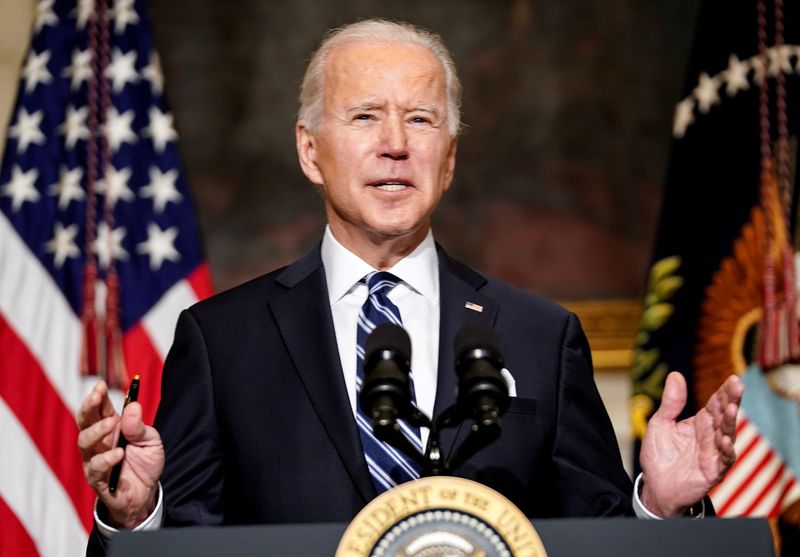By Valerie Volcovici and Timothy Gardner
WASHINGTON (Reuters) - U.S. President Joe Biden on Friday proposed $14 billion in spending on initiatives to fight climate change in the 2022 budget, including large cash injections for environmental regulation and science research.
The proposal underscores the administration's ambitions to decarbonizing the economy by 2050 to stem global warming, reversing a policy direction set by former President Donald Trump to slash red tape that hindered fossil fuel production.
Biden's so-called "skinny", or preliminary, budget proposal includes $11.1 billion for the U.S. Environmental Protection Agency, a 21.3% boost over last year's enacted level.
It also includes $10.2 billion for the National Science Foundation, up 20% from the 2021 enacted level, with $500 million of that going to climate and clean energy research.
An administration official told reporters that the infusion of funding would help restore the federal government's ability to respond to climate change after the previous administration slashed funding for scientific and regulatory agencies.
"Despite the growing threat of climate change, we've cut funding for climate science and technology," the official said, adding the new funding would "help restore the capacity needed to carry out core climate functions, to secure environmental justice for communities that have been left behind and to help developing countries reduce emissions."
The budget includes major new climate change investments and financial support for communities hardest hit by pollution or by the rapid transition away from fossil fuels to renewable energy.
The proposal allocates the largest amount ever to invest marginalized and overburdened communities - $1.4 billion, including $936 million toward a new Accelerating Environmental and Economic Justice initiative at the EPA, as well as $100 million to develop a new community air quality monitoring and notification program.
It also invests $550 million in a program to remediate abandoned oil and gas wells nationwide, tripling current funding, an effort that would create 250,000 jobs.
The request would also increase the Energy Department's budget by 10.2% to $46 billion. Among new programs it would fund, the DOE would invest $1.9 billion to launch a clean energy and workforce initiative that would help the Biden administration meet a goal of decarbonizing the electricity sector by 2035 through a clean electricity and energy efficiency standard.
GLOBAL CLIMATE FINANCE
The budget also gives a boost to U.S. efforts to boost climate aid overseas, a key goal of the administration that seeks to return to a leadership role on climate change ahead of the next U.N. climate summit in Glasgow in November.
Biden will host a climate leaders summit on April 22 and is expected to release a climate finance plan ahead of the online forum.
The budget request calls for a $1.2 billion contribution to the Green Climate Fund, a downpayment of the remaining $2 billion it owes. The Obama administration promised $3 billion to support the fund that assists developing countries reduce emissions and adapt to climate change.
The request also proposes $485 million to support other multilateral climate initiatives, including $100 million for international climate adaptation programs and $691 million for the State Department and U.S. Agency for International Development to assist developing countries in adapting

to climate disruptions.